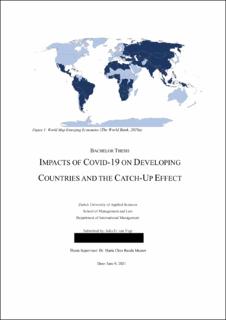Please use this identifier to cite or link to this item:
https://doi.org/10.21256/zhaw-24369Full metadata record
| DC Field | Value | Language |
|---|---|---|
| dc.contributor.advisor | Rueda Maurer, Maria Clara | - |
| dc.contributor.author | van Vugt, Julia D. | - |
| dc.date.accessioned | 2022-03-02T09:21:24Z | - |
| dc.date.available | 2022-03-02T09:21:24Z | - |
| dc.date.issued | 2021 | - |
| dc.identifier.uri | https://digitalcollection.zhaw.ch/handle/11475/24369 | - |
| dc.description.abstract | Since its emergence, COVID-19 has disrupted life globally. The World Bank, IMF, and OECD determined the pandemic to have had a severe impact on the world's economy in 2020, even more so than the World Financial Crisis in 2008. Whilst COVID-19 affected all countries, developing markets were especially vulnerable to the crisis due to their high employment rates in the informal sector and lower fiscal capabilities. Whilst forecasts for global economic growth in 2021 are optimistic, the recovery will vary between the different regions and income levels. This thesis aimed to compare the impacts of the pandemic on the economies of developing and advanced countries. The paper focused on evaluating developing markets' future capabilities to converge their GDP per capita with developed countries through higher GDP growth rates. Therefore, economic growth was analysed per region and income level for 2020, and forecasts for 2021 until 2026 were assessed. Additionally, the long-term impact of the decline of production factors in 2020 and the importance of existing levels of production factors for future development were evaluated. The findings revealed that the pandemic severely impacted both advanced and emerging economies. However, the crisis affected future growth prospects to varying degrees in the different regions of the world. As advanced economies recover fast, convergence is deemed volatile until 2022, and each region of emerging markets experiences divergent GDP per capita growth for at least one year. While Asian and European emerging markets display higher than average growth, Latin America can sustain growth rates similar to those in advanced economies. In contrast, the African countries and the Middle East struggle the most to reach high growth, mainly exhibiting divergent per capita growth rates in the future. Nonetheless, overcoming the effects of the pandemic is essential for all emerging markets, as a prolonged impact would considerably damage their convergence possibilities. Therefore, the rapid distribution of vaccines, leading to a faster reopening of the economies, is essential. The current forecast indicates that the decline in production factors during 2020 has a limited impact on future GDP per capita growth. Combined with additional economic contributions provided by governments, this supports a positive outlook for the future. To continue achieving sustained growth, emerging economies need to focus on advancing their level of investment and on further improving and expanding access to education. Lastly, the institutions within emerging countries, such as the rule of law, need to be strengthened. All the mentioned factors have shown a significant relation with higher growth and were recommended policy measures to support development in emerging economies even before COVID-19. However, since the pandemic is still ongoing, its impact should be re-evaluated continuously to derive the necessary policies to support the global economic recovery. | de_CH |
| dc.format.extent | 77 | de_CH |
| dc.language.iso | en | de_CH |
| dc.publisher | ZHAW Zürcher Hochschule für Angewandte Wissenschaften | de_CH |
| dc.rights | http://creativecommons.org/licenses/by-nc-nd/4.0/ | de_CH |
| dc.subject.ddc | 330: Wirtschaft | de_CH |
| dc.title | Impacts of Covid-19 on developing countries and the catch-up effect | de_CH |
| dc.type | Thesis: Bachelor | de_CH |
| dcterms.type | Text | de_CH |
| zhaw.departement | School of Management and Law | de_CH |
| zhaw.publisher.place | Winterthur | de_CH |
| dc.identifier.doi | 10.21256/zhaw-24369 | - |
| zhaw.originated.zhaw | Yes | de_CH |
| Appears in collections: | BSc International Management | |
Files in This Item:
| File | Description | Size | Format | |
|---|---|---|---|---|
| Bachelor Thesis_JvV.pdf | 1.82 MB | Adobe PDF |  View/Open |
Show simple item record
van Vugt, J. D. (2021). Impacts of Covid-19 on developing countries and the catch-up effect [Bachelor’s thesis, ZHAW Zürcher Hochschule für Angewandte Wissenschaften]. https://doi.org/10.21256/zhaw-24369
van Vugt, J.D. (2021) Impacts of Covid-19 on developing countries and the catch-up effect. Bachelor’s thesis. ZHAW Zürcher Hochschule für Angewandte Wissenschaften. Available at: https://doi.org/10.21256/zhaw-24369.
J. D. van Vugt, “Impacts of Covid-19 on developing countries and the catch-up effect,” Bachelor’s thesis, ZHAW Zürcher Hochschule für Angewandte Wissenschaften, Winterthur, 2021. doi: 10.21256/zhaw-24369.
VAN VUGT, Julia D., 2021. Impacts of Covid-19 on developing countries and the catch-up effect. Bachelor’s thesis. Winterthur: ZHAW Zürcher Hochschule für Angewandte Wissenschaften
van Vugt, Julia D. 2021. “Impacts of Covid-19 on Developing Countries and the Catch-up Effect.” Bachelor’s thesis, Winterthur: ZHAW Zürcher Hochschule für Angewandte Wissenschaften. https://doi.org/10.21256/zhaw-24369.
van Vugt, Julia D. Impacts of Covid-19 on Developing Countries and the Catch-up Effect. ZHAW Zürcher Hochschule für Angewandte Wissenschaften, 2021, https://doi.org/10.21256/zhaw-24369.
Items in DSpace are protected by copyright, with all rights reserved, unless otherwise indicated.